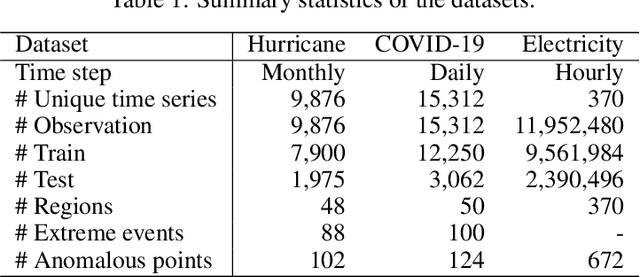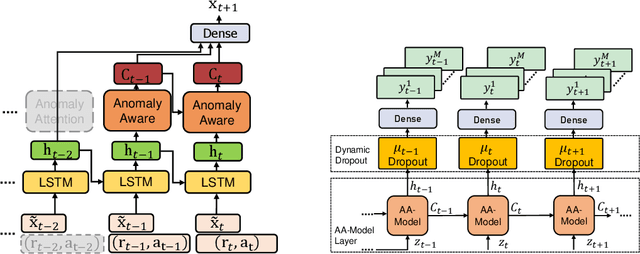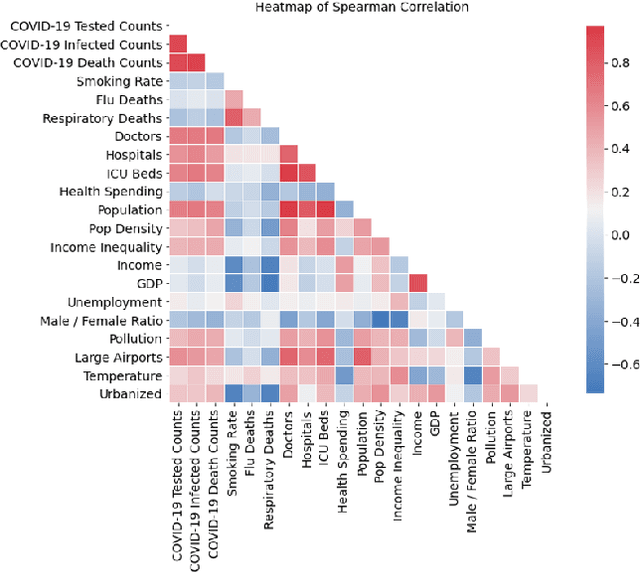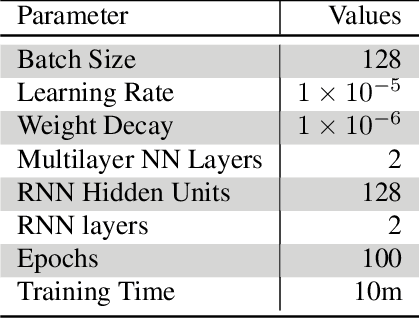Arthur Huang
AA-Forecast: Anomaly-Aware Forecast for Extreme Events
Aug 21, 2022



Abstract:Time series models often deal with extreme events and anomalies, both prevalent in real-world datasets. Such models often need to provide careful probabilistic forecasting, which is vital in risk management for extreme events such as hurricanes and pandemics. However, it is challenging to automatically detect and learn to use extreme events and anomalies for large-scale datasets, which often require manual effort. Hence, we propose an anomaly-aware forecast framework that leverages the previously seen effects of anomalies to improve its prediction accuracy during and after the presence of extreme events. Specifically, the framework automatically extracts anomalies and incorporates them through an attention mechanism to increase its accuracy for future extreme events. Moreover, the framework employs a dynamic uncertainty optimization algorithm that reduces the uncertainty of forecasts in an online manner. The proposed framework demonstrated consistent superior accuracy with less uncertainty on three datasets with different varieties of anomalies over the current prediction models.
Protoformer: Embedding Prototypes for Transformers
Jun 25, 2022Abstract:Transformers have been widely applied in text classification. Unfortunately, real-world data contain anomalies and noisy labels that cause challenges for state-of-art Transformers. This paper proposes Protoformer, a novel self-learning framework for Transformers that can leverage problematic samples for text classification. Protoformer features a selection mechanism for embedding samples that allows us to efficiently extract and utilize anomalies prototypes and difficult class prototypes. We demonstrated such capabilities on datasets with diverse textual structures (e.g., Twitter, IMDB, ArXiv). We also applied the framework to several models. The results indicate that Protoformer can improve current Transformers in various empirical settings.
* Advances in Knowledge Discovery and Data Mining (PAKDD 2022)
A Novel Deep Learning Model for Hotel Demand and Revenue Prediction amid COVID-19
Mar 08, 2022



Abstract:The COVID-19 pandemic has significantly impacted the tourism and hospitality sector. Public policies such as travel restrictions and stay-at-home orders had significantly affected tourist activities and service businesses' operations and profitability. To this end, it is essential to develop an interpretable forecast model that supports managerial and organizational decision-making. We developed DemandNet, a novel deep learning framework for predicting time series data under the influence of the COVID-19 pandemic. The framework starts by selecting the top static and dynamic features embedded in the time series data. Then, it includes a nonlinear model which can provide interpretable insight into the previously seen data. Lastly, a prediction model is developed to leverage the above characteristics to make robust long-term forecasts. We evaluated the framework using daily hotel demand and revenue data from eight cities in the US. Our findings reveal that DemandNet outperforms the state-of-art models and can accurately predict the impact of the COVID-19 pandemic on hotel demand and revenues.
* 55th Hawaii International Conference on System Sciences (HICSS) 2022
 Add to Chrome
Add to Chrome Add to Firefox
Add to Firefox Add to Edge
Add to Edge